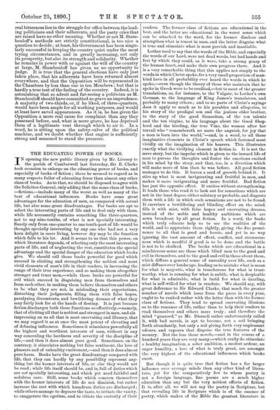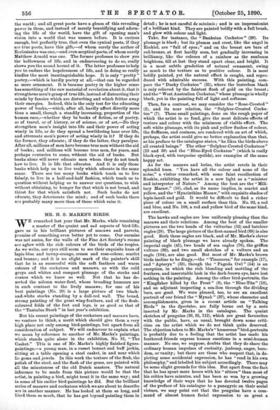THE EDUCATING POWER OF BOOKS.
IN opening the new public library given by Mr. Livesey to the parish of Camberwell last Saturday, Sir E. Clarke took occasion to enlarge on the educating power of books, and especially of books of fiction ; these he seemed to regard as in many respects fuller of educating force than almost any other class of books. As to that, we should be disposed to agree with the Solicitor-General, only adding that the same class of books, —fictions,—include many of the worst as well as many of the best of educational influences. Books have some great advantages for the education of men, as compared with actual life, but also some great disadvantages. For books are apt to select the interesting parts of life and to deal only with them, while life necessarily contains something like three-quarters, not to say nine-tenths, of what is not specially interesting. Surely only from one-quarter to one tenth-part of life would be thought specially interesting by any one who had not a very keen delight in mere living, however dry may be the function which falls to his lot. And it seems to us that this power, on which literature depends, of selecting only the most interesting parts of life, and of neglecting the rest, constitutes the special advantage and the special danger of the education which books give. We should call those books powerful for good which succeed in eliciting and strengthening the noblest and most vivid elements of man's life in their readers, in increasing the range of their true experience, and so making them altogether stronger and truer men,—while those books are powerful for evil which succeed in disguising men from themselves and from each other, in making them believe themselves and others to be what they are not, in misleading their expectations, disturbing their judgments, filling them with false hopes, paralysing discontents, and bewildering dreams of what they may fairly look for at the hands of destiny. It is just because fiction discharges both these functions so effectively,—namely, that of eliciting all that is noblest and strongest in man, and als impressing on us all that is most enervating and illusory, that we may regard it as at once the most potent of elevating and of debasing influences. Sometimes it stimulates powerfully all the highest and worthiest interests of man, without in any way concealing the hardness and severity of the discipline of life,—and then it does almost pure good. Sometimes, on the contrary, it stimulates nothing but false sentiment, the love of pleasure and of unhealthy excitement,—and then it does almost pure harm. Books have the great disadvantage compared with life, that they can hardly by any possibility represent any- thing but the keener interests of life, or else they would not be read ; while life itself should be, and is, full of duties which are not specially interesting, and which yet need faithful and sedulous care. Still, some books which concern themselves with the keener interests of life do not diminish, but rather increase the zest with which humdrum duties are discharged ; while others manage to deprave the taste, to irritate the vanity, to exaggerate the egotism, and to vitiate the curiosity of their
readers. The former class of fictions are educational in the best, and the latter are educational in the worst sense which can be attached to the word, for the former disclose and strengthen what is truest in man, and the latter disguise what is true and stimulate what is most peevish and insatiable.
Luther used to say that the words of the Bible, and especially the words of our Lord, were not dead words, but had hands and feet by which they could, as it were, take a strong grasp of the human heart, and make their own progress there. And it is a very remarkable thing that this applies not simply to the words in which Christ spoke, for a very small proportion of man- kind have in all probability ever heard the words in which he spoke,—even though the theory of those who maintain that he spoke in Greek were to be credited,—but to most of the greater translations, as, for instance, to the Vulgate, to Luther's own German, to the language of King James's translators, and probably to many others ; and to no parts of Christ's sayings does it apply so much as to his parables and allegories, to his story of the prodigal son and the jealous elder brother, to the story of the good Samaritan, of the ten talents and the ten virgins, to his language about the Good Shep- herd and the hireling, the true Vine, the woman after her travail who " remembereth no more the anguish, for joy that a man is born into the world,"—and, in a word, to all those imaginative elements in Christ's speech which fastened most vividly on the imagination of his hearers. This illustrates exactly what the vivifying element in fiction is. It is not the mere story, but the impulse which is given to the inward life of man to pursue the thoughts and foster the emotions excited in his mind by the story, and that, too, in a direction which will make more of him than he was before. All good fiction manages to do this. It leaves a seed of growth behind it. It stirs up what is most invigorating and fruitful in men, and makes it more invigorating and more fruitful. Bad fiction has just the opposite effect. It excites without strengthening. It leads those who read it to look out for sensations which are not in the least degree either salutary or probable, and disgusts them with a life in which such sensations are not to be found. It exercises a bewildering and blinding effect on the mind, fills it with mist, with false hopes and enervating dreams, instead of the noble and healthy ambitions which are sown broadcast by all great fiction. In a word, the books which truly educate help us to see the realities of the world, and to appreciate them rightly, giving the due promi- nence to all that is good and heroic, and yet in no way ignoring the vast amount of effort, conflict, and strenuous- ness which is needful if good is to be done and the battle is not to be skulked. The books which are educational in a mischievous sense are those which blind men to the good and evil in themselves, and to the good and evil in those about them, which diffuse a general sense of unreality over life, such as a mist diffuses over landscape, leading us to mistake what is mean for what is majestic, what is treacherous for what is trust- worthy, what is cunning for what is subtle, what is despicable for what is admirable, what is lurid for what is dazzling, what is self-willed for what is resolute. We should say, with great deference to Sir Edward Clarke, that much the greater number of novels which issue from the press in every year, ought to be ranked rather with the latter than with the former class of fictions. They tend to spread enervating illusions as to the romance of life, rather than to help their readers to read themselves and others more truly ; and therefore the mind " guanoed," as Mr. Disraeli rather unfortunately called it, with bad novels, is apt to become, not a soil bringing forth abundantly, but only a soil giving forth very unpleasant odours, and vapours that disguise the true features of the scenery. Not the less those novels,—and in the course of a hundred years they are very many,—which really do stimulate a healthy imagination, a sober ambition, a modest ardour, an eager humility, a love of what is truly great, are amongst the very highest of the educational influences which books exert.
But though it is quite true that fiction has a far larger influence over average minds than any other kind of litera- ture, yet for the comparatively few to whom poetry is not a foreign language, fine poems are a much higher education than any but the very noblest efforts of fiction. It is, after all, we will not say the poetry in Scripture, but that revealing life in Scripture which is of the essence of poetry, which makes of the Bible the greatest literature in the world ; and all great poets have a gleam of this revealing power in them, and instead of merely beautifying and adorn- ing the life of the world, have the gift of opening man's vision into a world that was unseen before. It is curious enough, but perfectly true, that even the cynical poets, if they are true poets, have this gift,—of whom surely the author of Ecclesiastes was one,—and even sceptical poets, of whom surely Matthew Arnold was one. The former professes to show you the hollowness of life, and in endeavouring to do so, really shows you the sound kernel of it. The latter professes to help you to endure the hopelessness of life, and in doing so really kindles the most inextinguishable hope. It is only " pretty " poetry,—which is hardly poetry at all,—that can be regarded as mere ornament. It is because poetry in the higher sense has something of the raw material of revelation about it, that it strengthens men's grasp of true life, instead of distracting their minds by fancies which are disturbing and which fritter away their energies. Indeed, this is the only test for the educating power of books,—which, after all, hardly affect directly more than a small, though a steadily increasing, proportion of the human race,—whether they be books of fiction, or of poetry, or of travel, or of history, or of science, or of art,—Do they strengthen men's insight into life and their power of acting wisely in life, or do they spread a bewildering haze over life, and attenuate men's power of acting wisely in it ? If they do the former, they educate ; if they do the latter, they paralyse. After all, millions of men have become true men without the aid of books ; and millions will become true men, for years, and perhaps centuries to come, without the aid of books. But books alone will never educate men whom they do not teach how to live. It is life that educates. And it is only those books which help us to live truly which educate in the same sense. There are too many books which teach us to live falsely, to live in a half-and-half fashion, which teach us to question without helping us to answer our questions, to wish without obtaining, to hunger for that which is not bread, and thirst for that which satisfieth not. Such books do not educate, they deteriorate the mind ; and of such books there are probably many more than of those which raise it.







































 Previous page
Previous page